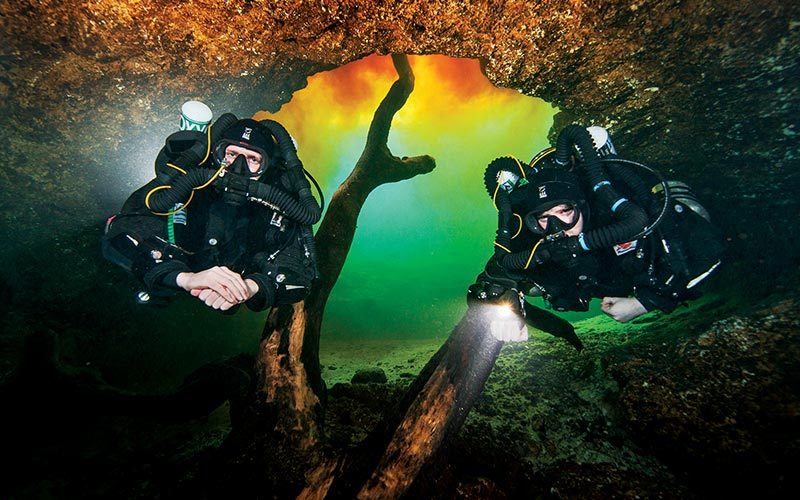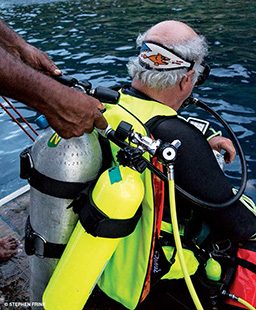Inexperience is often listed as a factor during analyses of deaths on roads, falls in climbing and fatalities in diving. But what is experience, and how does it affect divers’ risk of injury?
Experience involves some exposure to diving, but more than that it implies learning from that exposure, developing judgment about what to do when faced with similar situations in the future. The implication is that with time divers should be better equipped to make wiser choices. A single measure of experience for recreational divers does not exist, but some approximate measures may include the lifetime number of dives, years diving, highest certification level, number of dives made in the past year, number of hours diving and other logged diving variables. No individual measure has been identified as clearly providing the most protection against diving injuries. Each measure may be relevant to some hazards and less so to others.
A study of more than 1,000 recreational scuba dives in Western Australia found that 38 of the dives exceeded commonly accepted no-decompression limits and also that those divers were unlikely to have dived as deeply previously.1 Though they had been diving for twice as long as the other divers (10 years vs. five years), they were reaching new depths and then incurring decompression obligations. This increased their risk of decompression sickness (DCS), though none reported symptoms of DCS following these dives. A 2004 survey of 305 trained recreational divers found that within two years of certification 20 percent had not dived for at least a year,2 but that does not mean they had given up diving. Research shows that divers often return to the water after a year or more of inactivity; for example, a survey of 528 recreational divers aboard dive charter boats in Texas headed for an offshore dive found that 13 percent had not dived during the previous year.3
In these examples we see both longtime divers going beyond their previous experience and relatively new divers returning to diving after more than a year out of the water. Both groups might be considered at risk when compared with divers who have recently dived to similar depths. This assumption forms the basis for requiring minimum levels of experience for participation in certain training such as dive leader, instructor, cave diver and closed-circuit rebreather courses. During these courses divers learn new skills, and this highlights the difference between experience and skill set: Experience is earned over time through exposure to diving, while skills may be learned. Experience enhances a diver’s level of comfort and self-awareness in the water, while skills concern a diver’s mechanical ability to perform certain tasks. Indeed, it is even possible for an inexperienced diver to be highly skilled, especially if the diver is eager to reach the “top” of the sport as soon as possible.
An analysis of insurance claims for DCS among DAN members found that claims peaked for divers between the ages of 30-39, and thereafter claim rates fell in every 10-year period that followed.4 This may suggest that divers make safer choices with increasing age. We asked two experts in diving and diver training for their opinions on the interplay between dive experience and the risk of suffering a dive injury.
How do we measure experience?
Keith Cardwell: Experience in the context of recreational diving could be measured by number of dives, hours accumulated underwater, frequency and currency of diving experiences, locations dived and/or types of diving. Measurement of experience by many dive operations takes into account all of these indications and often relies on reviewing log books and/or the presentation of a certification card both to confirm experience and to indicate level of certification (and assumed skill level).
Bill Oigarden: Experience is multifaceted. For scuba diving we usually think of experience as the classes we’ve taken, certifications we’ve earned and our time in the water. But I contend that experience also includes your lifestyle and how you view the world. A diver with an aggressive personality style might say he or she is experienced after a short period, while a more laid-back or reflective personality may tend to seek more knowledge because there’s always something new to learn.
How does inexperience relate to risk of injury among new divers?
Cardwell: Considerably. Many new divers, particularly those in training, often have equalization injuries due to lack of familiarity with the available techniques. The worst-outcome diving events with which I am familiar occurred predominantly with relatively inexperienced divers.
Oigarden: I suspect most divers who continue to dive in open water after their initial certification continue to dive for the beauty of an environment nondivers never see. Inexperienced divers might get into trouble and panic, resulting in a dive injury. Driven divers may be more likely to get into trouble by exceeding their training and limitations.

How might having considerable diving experience relate to risk of injury among experienced divers?
Cardwell: One concern witnessed frequently is the effect of aging on abilities that require strength and/or stamina. I’m no spring chicken anymore, and I have to be more deliberate about what I do. Buddy checks, ascent and descent checks, and regular communication with buddies are still necessary even after thousands of dives. Ignoring basic rules such as these is a precursor to trouble.
Oigarden: Humble divers realize that they’re only as experienced as their last dive. Divers who consider themselves experienced can fall into several categories. One category includes divers who have been diving for 30 years or more and have made thousands of dives. These divers are now in their 50s, 60s, 70s and, in some cases, 80s. We are living and diving much longer than anyone expected. I think it’s safe to say that some of these thousands of older divers have some degree of cognitive decline. This decline might interfere with preparation of dive equipment, dive planning, willingness to admit to poor decisions and/or inability to solve a problem that 20 years earlier might have been solved instinctively. As experienced middle-aged divers, we may no longer be able to get away with a diving style we embraced decades earlier.
Could an extended break from diving increase the risk of injury even in experienced divers?
Cardwell: Yes, risk can be increased by presumptions about one’s capabilities after a long period of not diving. Short refresher courses are available through all training agencies. Risk can also be exacerbated by the use of unfamiliar equipment.
Oigarden: I took a break from diving while I was raising my children. So about 15 years ago I sought out an instructor I had known since the 1970s and signed up for an open-water course and a nitrox course. I took my time and learned the rationales underlying new techniques and procedures. I also spent a great deal of time learning about the new technology and its underpinnings.
Is it possible to gain experience quickly?
Cardwell: Yes, but experience takes time. Divers who devote a lot of time to their sport can arguably become better at it by meeting challenges and overcoming them through good training and other preparation; plenty of varied diving that sees a diver consistently following basic rules may prevent a host of potential problems from occurring. Similarly, more formal training can also speed learning. For example, being trained as a rescue diver could make dealing with a distressed diver underwater somewhat easier than it would be without the knowledge and skills learned in the course.
Oigarden: Yes and no. Some divers seem to have a natural disposition for being in a technically complex situation underwater in strenuous or stressful conditions. I would speculate that every buddy, instructor, dive leader, dive site and dive plan could influence how quickly a diver might become what could be considered experienced.
How do we recognize a diver going too far too soon — beyond his/her training and experience?

Cardwell: One good indicator is a diver who holds certifications that appear to have been gained with the minimum required experience. This is often reflected in the speed at which certifications were acquired and in the number of dives logged (assuming the dives logged are genuine). In my experience, those who wish to fast-track their qualifications are usually those who are more concerned with having the certification than having the skills.
Oigarden: A controversial answer would be a diver who completely relies on his dive partners’ experience. When divers can accurately explain the who, what, why, when and where of a dive from preparation to debriefing, then they are probably pacing themselves appropriately.
Is there a particular type of diver who is at higher risk of injury because of inexperience or because of considerable diving experience?
Cardwell: I can’t answer regarding someone with a lot of experience other than leaning on knowledge of the very few I have known who had accidents because of not accepting the limitations that aging imposes.
Oigarden: I speculate that divers such as Hal Watts, Tom Mount, Sheck Exley, Jarrod Jablonski and Casey McKinlay have a combination of physiology, psychology and drive that allows them to make extreme dives that most of us, no matter how much experience we gain, would not be able to duplicate. So in relation to these divers and others like them, the rest of us — if pushed to the extremes — have a much greater risk of a dive injury.
Is it possible that certain levels of experience relate to certain types of dive injuries?
Cardwell: Accidents can happen at any experience level but are more common among less experienced divers. Certainly, as mentioned earlier, equalization problems occur during training or early in divers’ experiences. This is due to either unfamiliarity with the available techniques and/or high anxiety levels. Accidents with the worst outcomes have been the result of neglecting basic safety precautions, presuming that all environments are similar and arrogantly and thoughtlessly ignoring the hazards involved.
Oigarden: I look forward to reading and maybe even being a part of a longitudinal look at divers’ experience, physiology, psychology and outlook on life to draw a set of new conclusions that continue to advance the safety of the sport we love so much.
Meet the Experts
Keith Cardwell, Ph.D., has trained more than 2,000 instructors and established highly regarded training centers in Australia, New Zealand, the Maldives and the USA. Cardwell holds a master’s degree in education, postgraduate diplomas in business administration and sport and recreation, and a doctorate in the study of workplace competence for recreational dive instructors. He has been operating on the Great Barrier Reef out of Cairns, Australia, for the past 16 years.
Bill Oigarden, Ph.D., began diving in 1967 and was certified in 1974. His expertise now spans four decades of cave diving, technical mixed-gas deep diving and operating a charter boat in South Florida and the Bahamas. Oigarden, who has degrees in underwater technology, business management and counseling, is trained in all facets of open-circuit sport and commercial diving, recompression chamber operation and as a life support technician. He earned a doctorate in 2013 while researching personality traits among cave divers.
References
- Buzzacott P, Pikora T, Heyworth J, Rosenberg M. Exceeding the limits — estimated tissue pressures among Western Australian recreational divers. Diving Hyperb Med. 2010; 40(4):201-205.
- Buzzacott P, Pikora T, Rosenberg M. Post-training dive inactivity in Western Australia. Diving Hyperb Med. 2008; 38(4):197-199.
- Ditton RB, Osburn HR, Baker TL, Thailing CE. Demographics, attitudes, and reef management preferences of sport divers in offshore Texas waters. J. Mar. Sci. 2002; 59:S186-S191.
- Denoble PJ, Ranapurwala SI, Vaithiyanathan P, Clarke RE, Vann RD. Per-capita claims rates for decompression sickness among insured Divers Alert Network members. Undersea Hyperb Med. 2012; 39(3):709-715.
© Alert Diver — Q3 Summer 2015